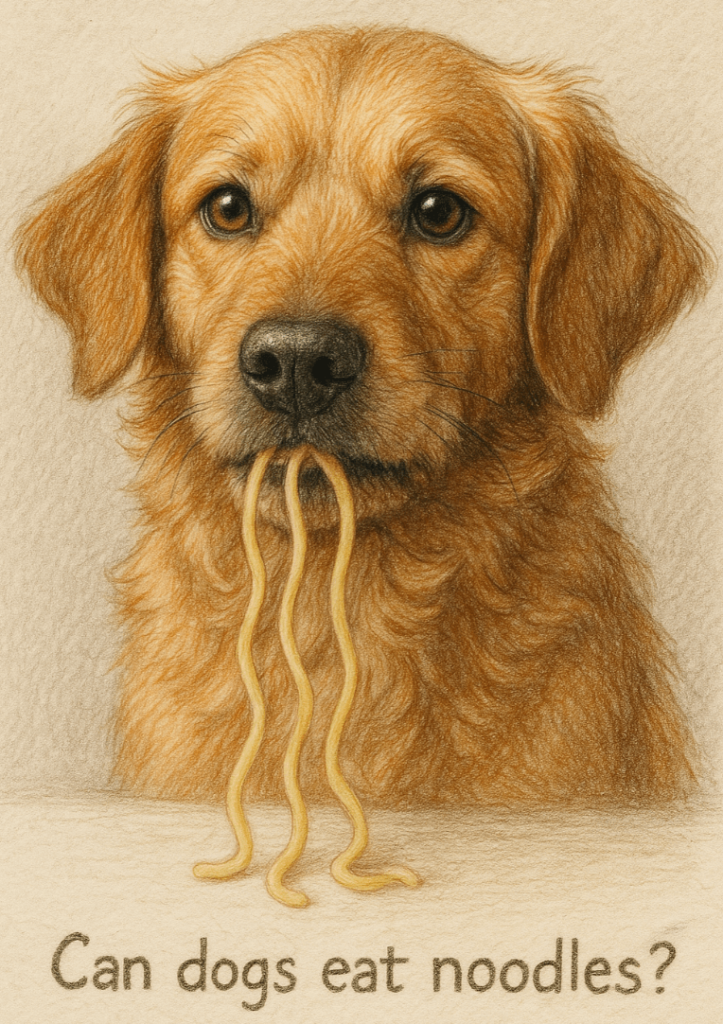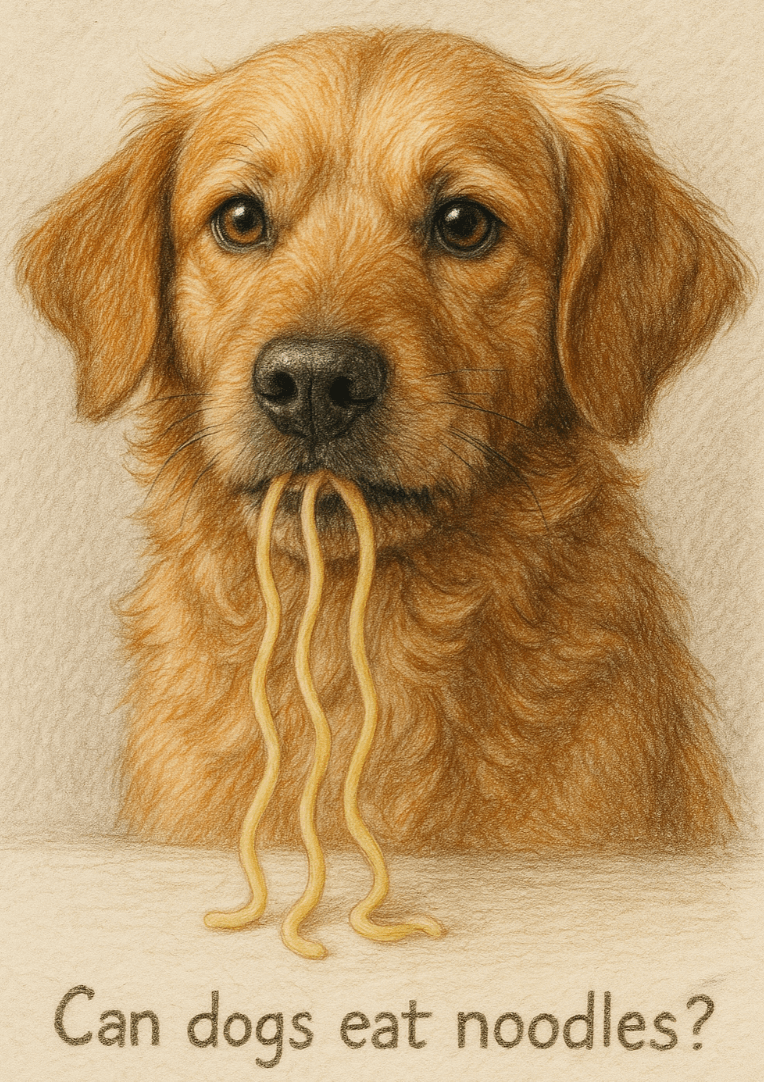Can Dogs Eat Noodles?
Noodles are a staple in many households, whether they’re part of a comforting bowl of pasta or a quick stir-fry dish. But what happens when your furry friend gives you those irresistible puppy eyes while you’re enjoying a plate of noodles? Can dogs eat noodles safely, or should this popular food remain off-limits for our canine companions? While plain noodles aren’t toxic to dogs, there are important factors to consider before sharing this human food with your pet. In this blog post, we’ll explore everything you need to know about feeding noodles to dogs, from potential risks to safer alternatives, ensuring your pup stays healthy and happy.
Potential Risks of Feeding Noodles to Dogs
While noodles themselves may not be inherently harmful, certain ingredients or preparation methods can pose risks to your dog’s health. Understanding these dangers is crucial to making informed decisions about sharing your meal.
High Carbohydrate Content:
Noodles are rich in carbs, which can lead to weight gain or digestive upset if consumed in excess.Added Salt and Seasonings:
Many noodle dishes contain high levels of sodium, spices, or sauces that can upset your dog’s stomach or even cause salt poisoning.Allergens in Wheat-Based Noodles:
Some dogs may have sensitivities or allergies to wheat, leading to symptoms like itching, vomiting, or diarrhea.Risk of Choking or Blockages:
Large pieces of uncut noodles can pose a choking hazard or cause blockages in the digestive tract.Toxic Ingredients in Toppings:
Common toppings like garlic, onions, or cheese can be harmful to dogs and should always be avoided.
These risks highlight why caution is essential when offering noodles to your dog. Always prioritize their safety over curiosity.
Benefits of Plain, Cooked Noodles for Dogs (in Moderation)
When prepared correctly, plain noodles can offer some benefits as an occasional treat for your dog. Here’s how they might contribute positively to your pup’s diet.
Easy to Digest:
Plain, cooked noodles are gentle on the stomach and can be a bland option for dogs recovering from gastrointestinal issues.Source of Energy:
The carbohydrates in noodles provide a quick energy boost, making them suitable for active dogs in small amounts.Hydration Support:
Soft, cooked noodles can help hydrate dogs who struggle to drink enough water, especially when served with broth.Customizable Base for Healthy Additions:
Plain noodles can serve as a base for adding safe, dog-friendly toppings like lean meats or vegetables.Affordable and Accessible Treat:
Noodles are an inexpensive and readily available option for occasional treats, especially during training sessions.
While these benefits exist, moderation is key to ensuring noodles don’t disrupt your dog’s balanced diet.
Check this guide 👉Can Dogs Eat Star Fruit? Best 7 Expert Tips!
Check this guide 👉Can Dogs Eat Banana Peppers? Best 7 Expert Tips!
Check this guide 👉Can Dogs Eat Fennel? Best 7 Expert Tips!

Safe Noodle Options for Dogs | Unsafe Noodle Preparations for Dogs |
|---|---|
Plain, unsalted rice noodles | Noodles with garlic or onion seasoning |
Whole wheat noodles (if no allergy) | Fried noodles with oil or butter |
Soft, cooked spaghetti without sauce | Noodles topped with cheese or cream |
Zucchini or vegetable-based noodles | Instant noodles with seasoning packets |
Homemade broth-soaked noodles | Spicy or heavily salted noodle dishes |
How to Safely Feed Noodles to Your Dog
If you decide to share noodles with your dog, it’s important to take precautions to ensure their safety. Follow these guidelines to minimize risks.
Choose Plain Noodles Only:
Opt for noodles without added salt, spices, or sauces to avoid digestive upset or toxicity.Cook Thoroughly:
Ensure noodles are soft and fully cooked to prevent choking or difficulty swallowing.Cut into Bite-Sized Pieces:
Chop noodles into small pieces to reduce the risk of choking or blockages, especially for smaller dogs.Limit Portion Sizes:
Offer noodles as an occasional treat rather than a regular part of their diet to avoid excessive calories.Monitor for Allergic Reactions:
Watch for signs of allergies or intolerance, such as itching, vomiting, or diarrhea, after feeding noodles.
By following these steps, you can safely incorporate noodles into your dog’s diet without compromising their health.
Signs Your Dog May Not Tolerate Noodles Well
Even with precautions, some dogs may struggle to digest noodles or react negatively to certain ingredients. Watch for these warning signs to act quickly if something goes wrong.
Vomiting or Diarrhea:
These symptoms may indicate that your dog’s stomach is sensitive to the noodles or accompanying ingredients.Excessive Gas or Bloating:
High-carb foods like noodles can cause gas buildup, leading to discomfort or bloating.Lethargy or Loss of Appetite:
A sudden lack of energy or refusal to eat could signal an adverse reaction to the noodles.Itching or Skin Irritation:
Allergic reactions to wheat or other ingredients may manifest as itching, redness, or swelling.Difficulty Breathing or Swallowing:
This could indicate a severe allergic reaction or choking hazard requiring immediate veterinary attention.
Recognizing these signs early allows you to seek veterinary care promptly, preventing further complications.
Common Mistakes to Avoid When Feeding Noodles to Dogs
Feeding noodles to your dog requires careful consideration to avoid mistakes that could endanger their health. Here are some pitfalls to watch out for.
Adding Harmful Toppings:
Ingredients like garlic, onions, or cheese can harm your dog and should never be included.Overfeeding:
Giving large portions of noodles can lead to weight gain or imbalance their diet.Ignoring Allergies:
Failing to check for wheat or gluten sensitivities can result in allergic reactions.Feeding Raw or Undercooked Noodles:
Uncooked noodles are harder to digest and pose a choking risk.Using Instant Noodles:
Packaged noodles often contain high levels of salt and artificial flavors that are unsafe for dogs.
Avoiding these mistakes ensures a safer and healthier experience for your dog.
Alternatives That Mimic the Texture of Noodles
If you’re hesitant about feeding noodles to your dog, there are plenty of alternatives that mimic their texture without the associated risks.
Zucchini Noodles (Zoodles):
Low-carb and nutrient-rich, zucchini noodles are a healthy substitute for traditional pasta.Sweet Potato Noodles:
These provide vitamins and fiber while offering a similar texture to regular noodles.Pumpkin Puree:
While not a noodle, pumpkin puree is soft, hydrating, and easy to digest for dogs.Rice or Quinoa:
These grains are gentle on the stomach and can be shaped into noodle-like forms.Homemade Broth-Soaked Bread Pieces:
Softened bread pieces soaked in dog-safe broth can mimic the comfort of noodles.
These alternatives allow you to cater to your dog’s cravings while keeping them safe.
Understanding Your Dog’s Nutritional Needs Around Human Foods
Dogs have specific dietary requirements that differ from humans, and understanding these needs helps explain why certain foods, like noodles, should be approached with caution.
Balanced Diet Importance:
Dogs require a mix of protein, fats, and carbohydrates; noodles alone don’t provide complete nutrition.Digestive Sensitivity:
Their digestive systems are less equipped to handle processed or seasoned foods compared to humans.Natural Instincts vs. Domestication:
While dogs are omnivores, their ancestors relied on meat-heavy diets, making carb-heavy foods like noodles less ideal.Portion Control Awareness:
Even safe foods can cause issues if fed in large quantities, disrupting their caloric balance.Individual Preferences:
Every dog is unique, and some may tolerate noodles better than others based on breed, size, and health.
By recognizing these factors, you can make smarter choices about incorporating human foods like noodles into your dog’s diet.
Frequently Asked Questions About Dogs and Noodles
Are all types of noodles safe for dogs?
No, plain, cooked noodles without additives are safest. Avoid instant noodles, fried noodles, or those with harmful toppings.
Can puppies eat noodles?
Puppies have sensitive digestive systems, so noodles should only be given in very small amounts and under supervision.
What should I do if my dog eats spicy noodles?
Monitor for symptoms like vomiting, diarrhea, or lethargy, and contact your vet if any issues arise.
How often can I give my dog noodles?
Noodles should be an occasional treat, not a regular part of their diet, to avoid nutritional imbalances.
Are gluten-free noodles better for dogs?
Gluten-free options like rice noodles may be better for dogs with wheat allergies but still require moderation.
Prioritizing Your Dog’s Health When It Comes to Noodles
Feeding noodles to your dog can be a safe and enjoyable experience if done responsibly. While plain, cooked noodles offer some benefits as an occasional treat, they also carry risks if prepared improperly or fed in excess. By understanding the potential hazards, choosing safe options, and consulting your veterinarian, you can ensure your dog stays healthy and happy. Remember, your furry friend relies on you to make the best dietary choices for them—so always prioritize their well-being above all else.
Do Cats Have Taste Buds? Best 7 Expert Tips! – Discover how cats experience flavors and why their taste is so unique.
Do Dogs Have Taste Buds? Best 7 Expert Tips! – Discover how dogs experience taste, their preferences, and what it means for their diet and health.
Can Cats Taste Sweet? Best 7 Expert Tips! – Discover why cats can’t taste sweetness, how it affects their diet, and tips to keep them healthy and happy.
Can Dogs Taste Sweet? Best 7 Expert Tips! – Discover how dogs perceive sweetness, which foods are safe, and tips to manage their sweet cravings responsibly.





